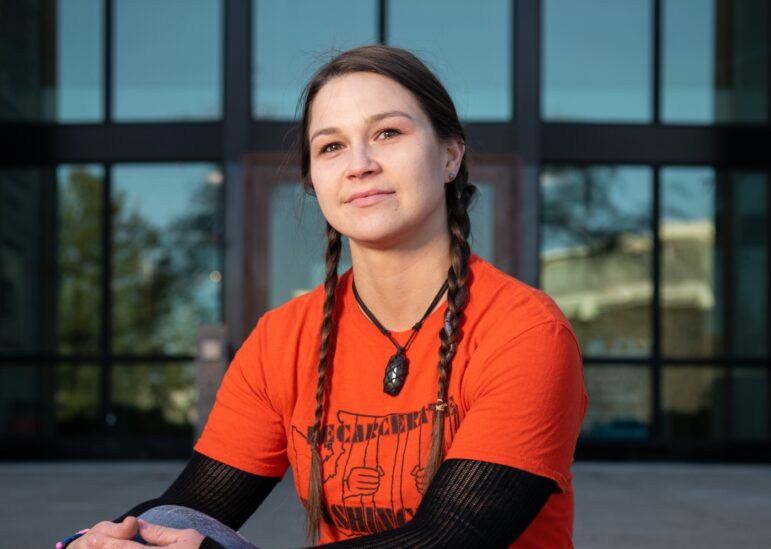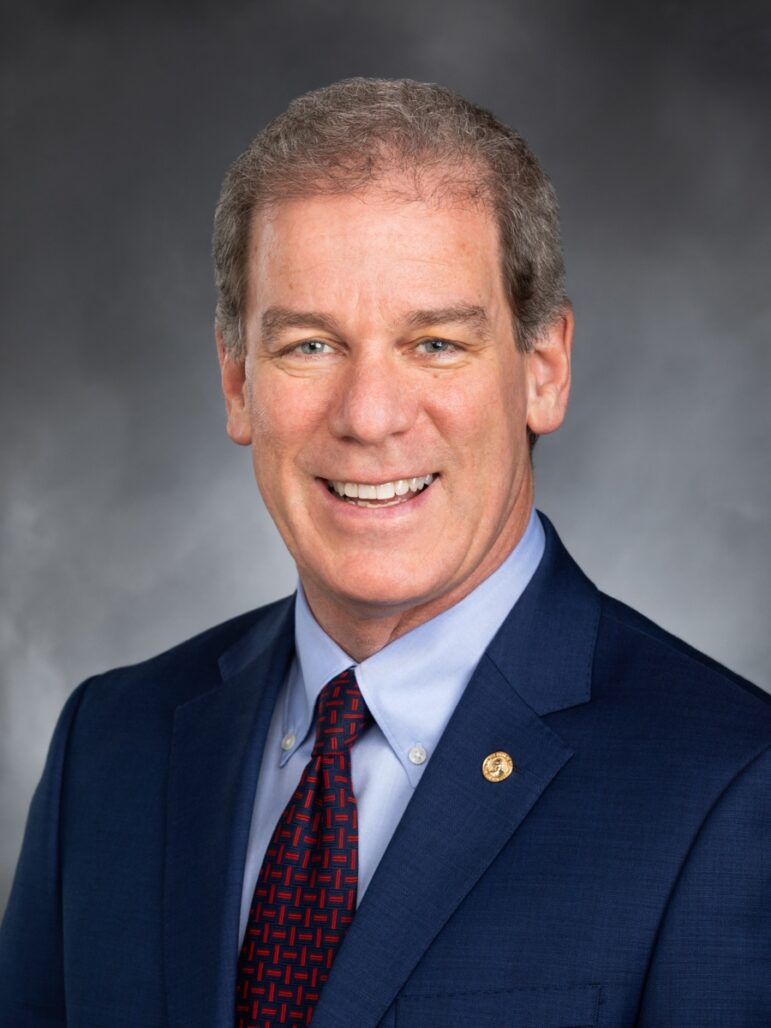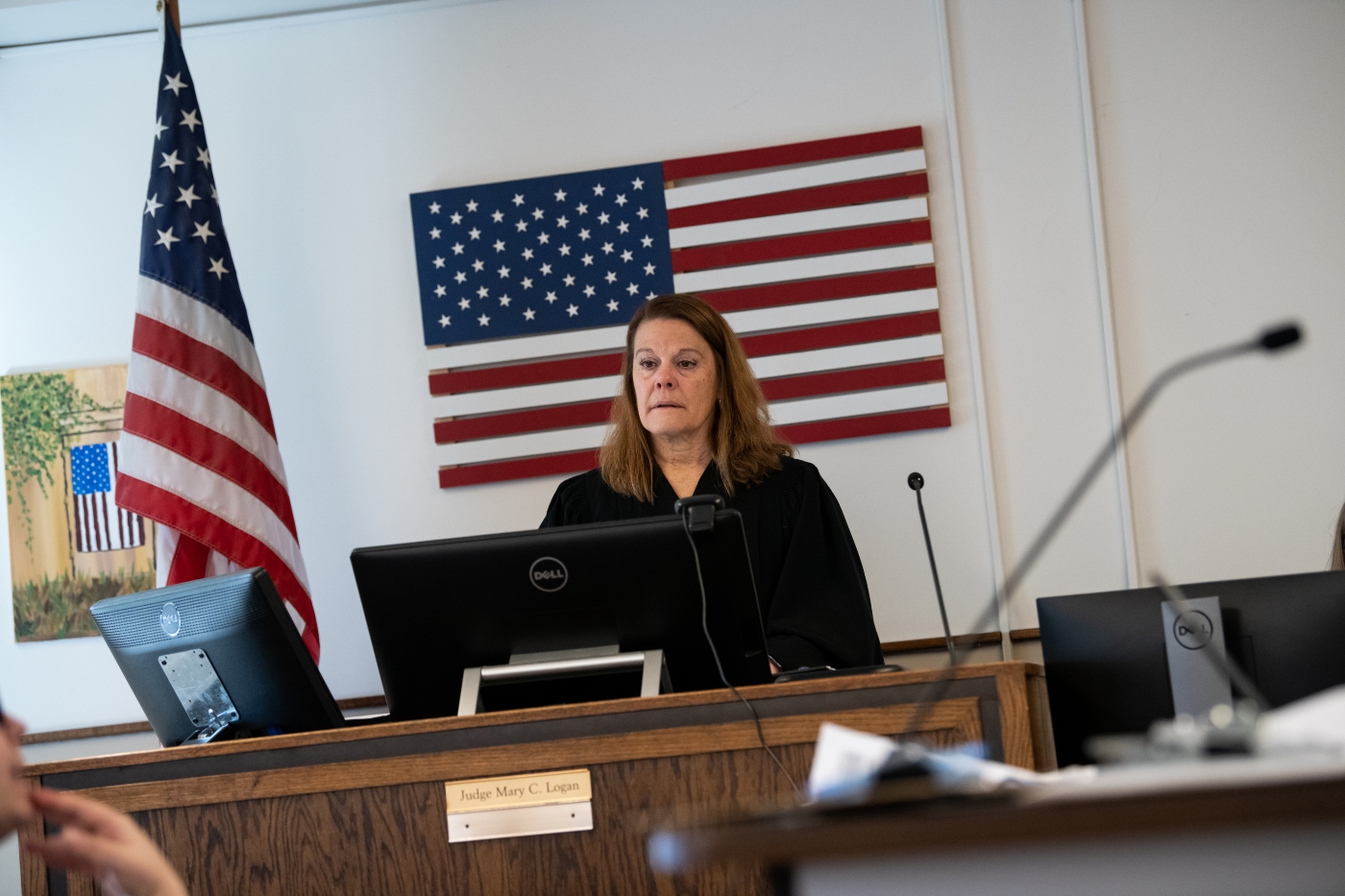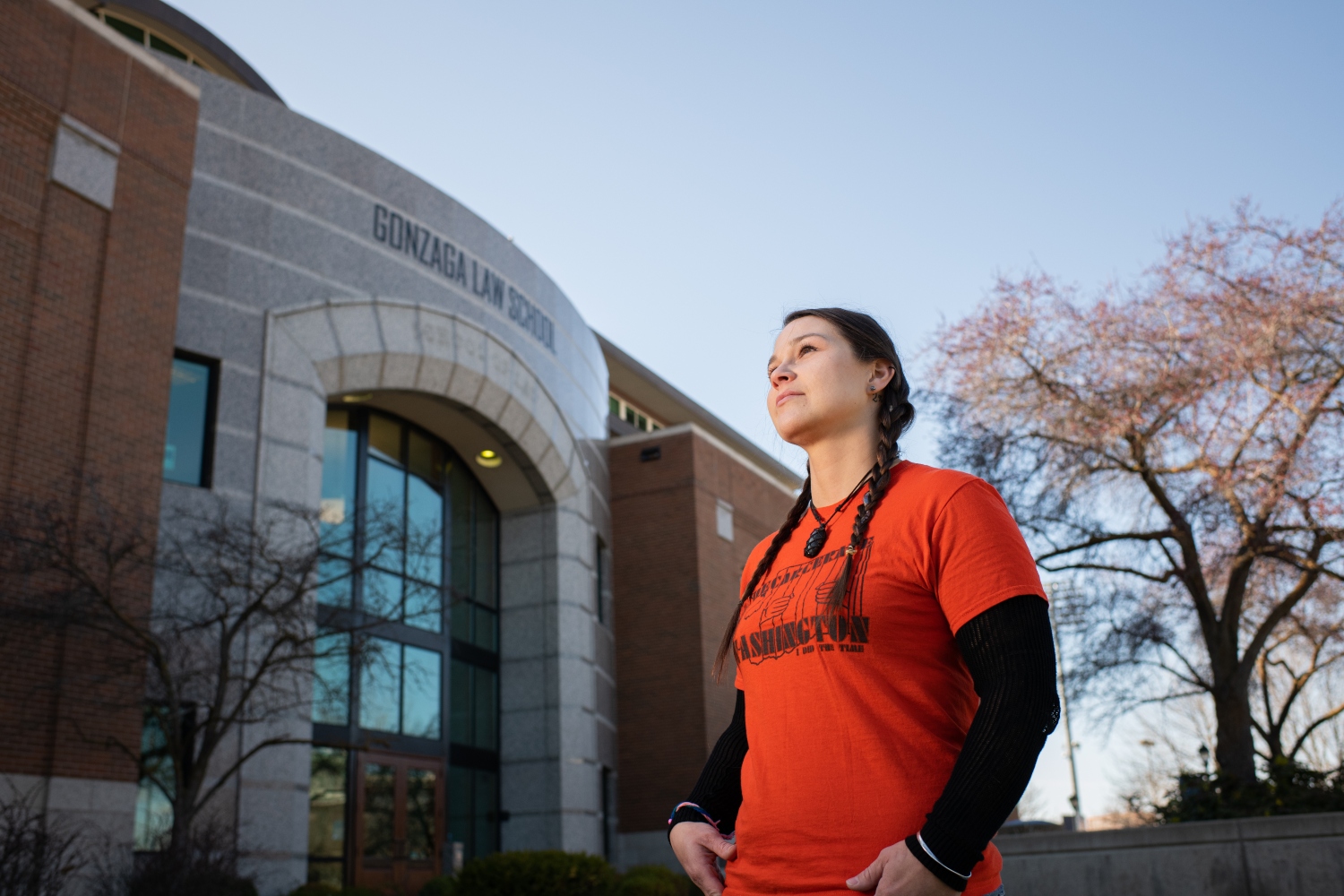Ten years ago, while driving to her nephew’s birthday party, Amber Letchworth was pulled over by an Asotin County sheriff’s deputy near the town of Clarkston. Letchworth says at the time, she was a 20-year-old college student in the midst of a mental health and addiction crisis following the death of her grandmother. On the floor of the car, the deputy found a dirty baggy. It contained meth.
Letchworth was taken to Asotin County Jail, in the southeast corner of Washington. She stayed there for the next couple weeks, unable to pay for bail, and with no access to pretrial services that exist today in many other jurisdictions meant to keep unconvicted defendants out of jail.
In that short amount of time, she lost her housing and access to a car. Feeling the pressure to get out of jail quickly, she pleaded guilty to the felony drug possession charge — a charge that’s since been vacated due to a state Supreme Court decision in 2021 that ruled Washington’s felony drug possession statute was unconstitutional.
It spurred a downward spiral for Letchworth. She was homeless when she left the jail, and as her drug and alcohol addiction issues worsened, it led to more arrests and more jail time.
Today, Letchworth is a law school student at Gonzaga University, co-founder of the Revive Center for Returning Citizens and a legal liaison for I Did the Time, an advocacy group working to help former inmates. But she still wonders how those dark years of her life would have been different if after that arrest, she had been let out of jail, able to keep her housing and referred to mental health or addiction treatment.
“What if I would have gotten pretrial services the first time?” she asks.
Letchworth is part of a movement of advocates, judges and public defenders in Washington pushing to release more defendants from jail while awaiting trial. They argue that alternative measures such as drug and alcohol testing, electronic home monitoring, and behavioral health treatment can help lift those accused of crimes out of the criminal justice system. Law enforcement and prosecutors have been slow to embrace the idea, fearing that people released from jail while awaiting trial will commit more crimes in the community.

As it is now, the availability and cost of these pretrial services in Washington depends heavily on where an alleged crime occurs. Many rural counties in eastern Washington and along the Olympic Peninsula don’t have a pretrial services program at all, filling the jails with defendants awaiting trial. Among those that do have such programs, most jurisdictions contacted by InvestigateWest require the accused to pay fees associated with their pretrial release — a barrier that disproportionately punishes poorer defendants and prevents some from being released from jail.
A person arrested for driving under the influence of alcohol in the city of Spokane, which funds defendant costs for pretrial services, may be released while the court pays for the costs of supervision. But that same person arrested for the same crime in another part of Spokane County would likely be on the hook for pretrial services such as an alcohol ankle monitor that can cost as much as $500 per month. Those high-cost services often result in low-income defendants remaining behind bars, further disrupting their ability to maintain employment or housing.
It’s what Ali Hohman, director of legal services for the nonprofit Washington Defender Association, calls “justice by geography.”
“Where you’re at in the state will dictate your bail amount, and it will dictate your ability to access pretrial services,” Hohman says.
Growing Movement
The movement to eliminate geographical barriers in bail and pretrial reform extends far beyond Washington. But as other states have led the way in upheaving their systems, Washington has been slow to follow suit.
New Jersey passed a law in 2017 that essentially eliminated cash bail, which forces defendants to post a certain amount of money set by the judge for their release. Despite concerns that released defendants would commit more crimes and skip court dates, the data indicates that hasn’t happened. Recidivism and court appearance rates have stayed consistent. And importantly for reform advocates, fewer defendants are stuck in jail just because they can’t afford bail. Since then, other states like Illinois have eliminated cash bail while creating a statewide centralized pretrial services office.
That’s the kind of model that may allow defendants in Washington’s rural counties to still have access to pretrial services, says state Rep. Roger Goodman, D-Kirkland. But right now, Washington is only in the beginning stages of exploring such options, says Goodman, who has served as chair of the House Public Safety Committee and has pushed for reform.
“We are by no means a model or a showcase for how pretrial services should be provided,” Goodman says. “We really don’t have a robust system of pretrial services in our state compared to some other states.”
Right now, Washington gives local control to jurisdictions to attempt their own reforms. Yakima County in 2016 began releasing low-risk offenders while providing pretrial services, and a study on the program found similar results to what New Jersey found: More people were released, there was less racial disparity in those kept in jail, and most did not go on to commit new crimes.
Other jurisdictions don’t have the resources to create those programs. Several years ago, the Legislature commissioned a task force to examine the issue. It released a report in 2019 that found gaps in the availability of pretrial services, most notably that 21 counties had no pretrial service programs at all.
Even where pretrial services existed, jails were still filled with people awaiting trial. Nationwide, two-thirds of all local jail inmates were awaiting trial, according to federal statistics, and Black and Native American people were jailed at much higher rates than White people. But in Washington’s largest counties, pretrial defendants in 2019 made up an even larger portion of the jail population. More than three-quarters of people in jails in King, Pierce and Spokane counties were there for a crime they hadn’t been convicted of, indicating pretrial reform efforts were still in early stages.
Those figures have been dramatically altered during the pandemic, with jails releasing defendants to prevent COVID-19 outbreaks. King County, for instance, has mostly stopped jailing people accused of misdemeanors. Seattle has since seen a small increase in crime, particularly violent crime, but those are trends in line with the rest of the country.
Advocates and public defenders like Hohman hope that the pandemic forcing counties to release people from jail shows that pretrial reform is possible.
“The world didn’t go to hell in a handbasket,” Hohman says.
‘Piecemeal’ Approach
Rural counties have struggled to manage pretrial services during the pandemic.
Of the counties identified as having pretrial programs by the state task force report in 2019, some of those contacted by InvestigateWest have lost those programs entirely. Asotin County Superior Court where Letchworth was jailed started a program to monitor defendants released pretrial several years ago, but County Clerk McKenzie Campbell says it was manned by one person who left the position months ago.
“I don’t believe it’s being actively offered to people,” Campbell says.
Less populated counties that do have a pretrial services program still face logistical challenges. Okanogan County District Judge Charles Short says if someone charged with a DUI is released on the condition that they receive alcohol monitoring, they may not be able to afford the testing device.
“We’re dealing with a lot of people that don’t have a lot of income. That can create an issue if they’re required to do alcohol monitoring or electronic home monitoring,” Short says.
And if the defendants don’t have transportation, they may have difficulty making court dates, especially in an expansive county like Okanogan in northeast Washington. It could take hours for those on the outskirts of the county to make it to the courthouse. The county started offering remote hearings during the pandemic, but Short notes that many Okanogan residents don’t have internet access.
In Whitman County, District Judge John Hart says he can release someone under the condition that they get an alcohol ankle monitor, but the company that sets them up is in Spokane County, so it costs extra due to transportation costs. That can be prohibitive for low-income defendants. Ideally, Hart hopes that’s a cost that the government can pay for.
“I believe it’s both a worthy allocation of resources, but also an important one to make sure an individual’s released on the least restrictive alternative affording them and those around them safety,” Hart says. “It’s also cost effective.”
The pretrial task force report recommends that the government bear the cost of services rather than the accused. Some jurisdictions do cover those costs, either in full or in part. In Seattle Municipal Court, there is no cost to the accused person for pretrial services unless they need a device under electronic home monitoring or alcohol monitoring, in which case the court will subsidize the cost for low-income defendants.
The city of Spokane, through money that comes from grants, funds services such as alcohol or home monitoring. Spokane Municipal Judge Mary Logan, who was on the statewide task force, says it can cost more than $100 per day to keep someone in jail, so funding a home monitoring device for $14 per day is well worth it.
But with each jurisdiction left to make these decisions, the current “piecemeal” approach to pretrial services across the state is inevitable, she says. And county leaders may not be on board with reforming the system in the first place, fearing it will result in dangerous offenders being let out on the streets with no consequences.
“All of a sudden politics gets involved,” Logan says.
Things Fall Apart
In 2016, Jaime Hawk, legal strategy director for the Washington Campaign for Smart Justice at the ACLU of Washington, authored a report calling for major changes to the pretrial system. The report argued that pretrial detention not only harms those who are jailed in their personal lives, but makes them more likely to be convicted of low-level misdemeanors because they feel more pressure to take a plea deal and get out.
“As a former public defender, when my clients were released pretrial and I was able to work with them and their families, and they were able to keep their jobs and housing … my ability to get a better outcome for them was nine times out of 10,” Hawk says.
Around the same time, Spokane County started receiving millions of dollars in grants from the Chicago-based MacArthur Foundation to reduce the jail population and racial disparities among those who are incarcerated. The grants include hundreds of thousands of dollars for a supported release program that would allow Spokane County District Court judges to release certain defendants and connect them with community resources instead of keeping them in jail.
But the reforms have been met with resistance within the county government. Maggie Yates, the woman chosen to lead reform efforts, reportedly resigned because she felt she wasn’t allowed to do her job. Implementation of the supported release program stalled, enough to frustrate the MacArthur Foundation into threatening to ask for $281,297 back last year. In public meetings about the program last fall, the Spokane County Prosecutor’s Office said it was “opposed” to the program because it believed connecting defendants to services without conditions didn’t provide enough “accountability” and may lead to defendants missing court dates.
County commissioners have since agreed to have a third-party vendor run the supported release pilot program. But in an email to InvestigateWest, Spokane County Prosecutor Larry Haskell says his office does not “resist” supported release, but he’d rather have the program run through the county’s own pretrial services program due to liability concerns.
“By keeping supported release ‘in house’ through pretrial services, we believe that the financial liability to the County, should a person who is placed on supported release commit another crime, is minimized,” Haskell says.
Often, county defendants must pay extra costs associated with their pretrial release, when those same costs might be covered if they were arrested within Spokane city limits. During the peak of the pandemic, the nonprofit Smith-Barbieri Progressive Fund covered some defendants in District Court if they couldn’t afford electronic home monitoring or other fees. Executive Director Lerria Schuh says she’d get calls from public defenders asking if the fund would cover anything from an electronic monitoring device to a $20 urine test, because that was the only thing keeping the defendant in jail.
“If you’re arrested in the city and you’re low-income, you have a fighting chance,” Schuh says. “If you’re picked up by the county, they don’t offer any help. What ends up happening is folks end up staying in jail because they don’t have the money.”
Kyle Madsen, a Spokane County public defender, tapped the funds to help his clients. Most of his clients are low-income or unhoused, and many of their charges were the result of mental illness.
“I think it’s easier for people in Spokane to understand that criminals go to jail, and we shouldn’t pay for a criminal to be free,” Madsen says. “But it’s not like we’re saying ‘you’re free.’ It’s that they’re being monitored while they have charges.”
For Hawk, the difficulties implementing the program highlight the uphill battle reform efforts could face, and why there are such disparities county-by-county in Washington.
“It’s so sad because I wanted Spokane to be the model for the rest of the state,” Hawk says.
This map was created based on Washington’s Pretrial Reform Task Force report in 2019. Some jurisdictions may have eliminated their pretrial services programs or added programs since then.
Going Forward
When the pretrial task force report came out in 2019, it made a series of recommendations on top of the idea that governments should bear the cost of pretrial services.
It also recommended that courts set up reminders for defendants to reduce their risk of missing court dates, that courts make more referrals to mental or behavioral health treatment, and that courts consider transportation support for defendants to make appointments.
But at the time, the report didn’t make waves across the state.
“It really just put into black and white what I always suspected with the justice by geography,” says Hohman, with the Washington Defender Association, an organization advocating for public defenders. “There wasn’t any sort of collective change in the winds from what I could tell.”
Hawk, with the ACLU, is working with academic researchers to figure out what can be learned from keeping misdemeanor defendants out of jail during the pandemic. But for now, she feels confident in her position that counties should be offering pretrial services that are paid for by the county, not the defendant.
“There’s a lot that can be done at the county level,” she says.
Rep. Goodman calls the recommendations from the task force “anemic.” He thinks that as long as there isn’t a unified court system and pretrial services program in Washington, you’re going to see disparities across jurisdictions.
But a statewide change like that could take years to do, Goodman says. There’s still more data to study on what programs are most effective. Judges, he says, are “arguing with themselves” over who’s to blame for confining too many people in jail.
“As far as any reform of pretrial policy, we are a ways away,” Goodman says.
That change, however, can’t come soon enough for people like Letchworth. While she’s been able to move on from her arrests in Asotin County a decade ago, she still works with people every day who could benefit from a pretrial system that doesn’t default to jailing them.
“The people that need the services the most,” Letchworth says, “are denied from the gate.”
Anushuya Thapa contributed to this report.
InvestigateWest (invw.org) is a news nonprofit dedicated to investigative journalism in the Pacific Northwest. Visit invw.org/newsletters to sign up for weekly updates.
FEATURED IMAGE: The Spokane County Jail (Erick Doxey/InvestigateWest)








